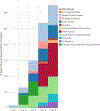Development of Clinical Domain Working Groups for the Clinical Genome Resource (ClinGen): lessons learned and plans for the future
- PMID: 30181607
- PMCID: PMC6401338
- DOI: 10.1038/s41436-018-0267-2
Development of Clinical Domain Working Groups for the Clinical Genome Resource (ClinGen): lessons learned and plans for the future
Abstract
The Clinical Genome Resource (ClinGen) is supported by the National Institutes of Health (NIH) to develop expertly curated and freely accessible resources defining the clinical relevance of genes and variants for use in precision medicine and research. To facilitate expert input, ClinGen has formed Clinical Domain Working Groups (CDWGs) to leverage the collective knowledge of clinicians, laboratory diagnosticians, and researchers. In the initial phase of ClinGen, CDWGs were launched in the cardiovascular, hereditary cancer, and inborn errors of metabolism clinical fields. These early CDWGs established the infrastructure necessary to implement standardized processes developed or adopted by ClinGen working groups for the interpretation of gene-disease associations and variant pathogenicity, and provided a sustainable model for the formation of future disease-focused curation groups. The establishment of CDWGs requires recruitment of international experts to broadly represent the interests of their field and ensure that assertions made are reliable and widely accepted. Building on the successes, challenges, and trade-offs made in establishing the original CDWGs, ClinGen has developed standard operating procedures for the development of CDWGs in new clinical domains, while maximizing efforts to scale up curation and facilitate involvement of external groups who wish to utilize ClinGen methods and infrastructure for expert curation.
Keywords: ClinGen; expert curation; genomic medicine.
Conflict of interest statement
Figures



References
Publication types
MeSH terms
Grants and funding
LinkOut - more resources
Full Text Sources
Other Literature Sources

